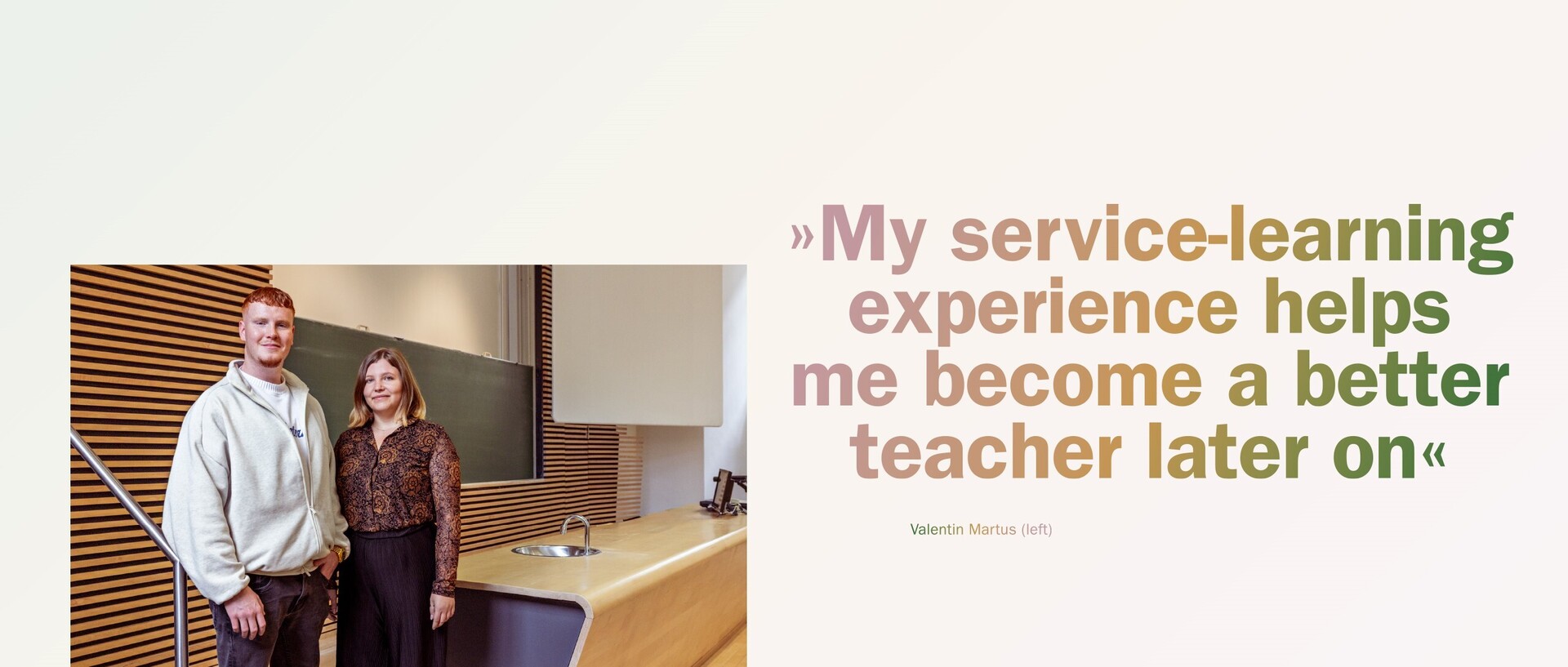Community Service for Credit
Applying your classroom learning in practice and doing good at the same time – that’s the idea behind service learning, a teaching format at the University of Mannheim. It’s a win-win situation for everyone involved: Students gain real-world experience working in projects while our community partners benefit from their support.
Every Thursday at 2:30 pm, Jana Steinhauer and Valentin Martus head off for a hands-on learning experience. Their destination: Uhland Werkrealschule, a secondary school in Neckarstadt Ost. That’s where they meet with a handful of sixth graders to do vocabulary exercises, practice reading comprehension and talk about situations in their everyday school life. “UNI-Kurse: Förderunterricht im Nachmittagsbereich,” or “remedial lessons in the afternoon,” is the name of the project in which the two Mannheim students are involved as part of a service-learning course.
Service learning, which was developed in the United States, is a teaching format in which students implement the theoretical contents of their studies in community service projects in cooperation with outside partners. The goal is to enhance student’s social and personal skills in addition to their subject-related expertise.
At the University or Mannheim, this type of learning goes back a long way: The first service-learning courses were offered in 2003. “Mannheim education scholar and psychologist Prof. Dr. Manfred Hofer was one of the first to introduce this teaching approach in Germany, here at the University of Mannheim,” says Julia Derkau, who is responsible for implementing the teaching format at the Center for Teacher Education and Educational Innovation (ZLBI). “Today, service learning is offered at all universities. But the University of Mannheim continues to have a leading role in the community, and we keep developing the concept within the network on an ongoing basis.”
Martus and Steinhauer are in their fourth semester of a master’s program to become teachers in German and history. The service-learning seminar at the Chair of Educational Psychology is a standard, ECTS credit-bearing course in their curriculum; enrollment is optional. “Last year, I completed my school-based practical semester, and I thinks it’s great to be able to gain even more professional experience,” says Steinhauer, explaining her motivation. Martus agrees: “The course provides us with valuable experience. What I learn here helps me become a better teacher later on.”
A wide range of course options
Service-learning courses are not only available to students enrolled in teacher training programs. The School of Humanities, for example, currently runs a course in conjunction with the event venue Alte Feuerwache, exploring issues of cultural diversity, cultural education and the implementation of corporate policies. Mathematics students can take a seminar in which they conduct extracurricular math courses, workshops, and remedial classes in cooperation with Mannheim schools.
A remedial class is also what Steinhauer and Martus are offering. Children are selected for these classes by their teachers based on tests. “Many of these kids come from immigrant families and are one or two years behind in their language development level,” Steinhauer reports. “We teach reading and writing strategies and help the kids improve their vocabulary,” Markus adds. “I teach them how to understand a text step by step. To do so, they need to practice reading closely, forming units of meaning and doing some preliminary work to adopt a structured method that will enable them to eventually answer written questions or write summaries.” To complement these hands-on activities, students attend a discussion class each week in which they share their experiences with other service-learning participants and their instructors; they also get feedback and new input.
For Steinhauer and Martus, the course ends after one semester, but the university’s cooperation with the schools is being continued. In the next semester, other students will teach the remedial classes. Martus will continue his involvement on a voluntary basis during the semester break: “For me, standing in front of a small class is good practice. And for the kids, it means more continuity in their tutoring.”
Text: Katja Bauer / August 2024
The interviews for the articles in this section took place in May and June 2024. It is possible, therefore, that officeholders have changed between the editorial deadline and the time the magazine went to print, or that some information is no longer up to date.
